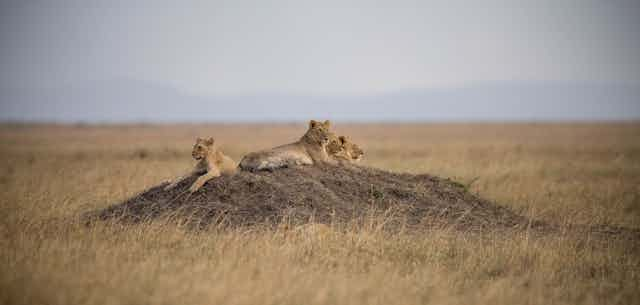The main drivers of species extinction are habitat loss and human-wildlife conflict, but it still takes a lot for these events to hit international headlines. They did recently, however, when the world famous Marsh Pride lions were allegedly poisoned by Maasai tribesmen.
These lions were the stars of the BBC’s Big Cat Diary TV series and a popular tourist attraction in the Maasai Mara National Reserve in Kenya. At least two lions were reported to have been killed and two local men have been arrested and could face life imprisonment if found guilty of harming them. The motive given was retaliation. It is thought that the men’s cattle had been grazing in the park the day before and were killed by lions. It was then easy to poison the carcass, knowing the lions would return to the kill.

Unfortunately though, this is not a rare event. People kill wildlife for similar reasons throughout this part of Kenya. My work on the western border of the Maasai Mara has recorded over 500 examples of crop raiding by elephants in the last two years. This led to at least two elephants being killed in retaliation last year alone.
These acts are often heavily criticised by foreigners and city dwellers but sharing land with wildlife is not easy. Many of the people are poor and feel powerless when animals eat their crops or livestock. These feelings then turn to animosity towards wildlife when their concerns are ignored. So, the illegal and ruthless killing of the Marsh Pride lions sends a clear message that conservation in the Mara ecosystem is working neither for wildlife nor people.

Maasai farmers
Part of the problem is human population growth. Kenya’s population size has tripled in the last 50 years and people’s lives are changing. In the Mara ecosystem many Maasai people are shifting from being pastoralists to farmers. They are converting their land to crops but still have strong economic and cultural links to cattle herding. This spread of farming reduces natural habitat and increases elephant crop raiding. It also reduces pasture land, so many people now take their cattle into the Maasai Mara Reserve.
The fact that so many cattle are illegally grazing in the reserve shows that conservation management is also currently weak. Just as significantly, it also shows that many communities around the Maasai Mara Reserve do not see any benefits from the wildlife it contains.
This is despite the law stating that these people should receive a percentage of the reserve revenue each year. At the moment, almost none of this money goes into the pockets of the poor, despite the land originally belonging to the Maasai before it was taken for conservation.

Solving these problems can only happen with action at a higher level. A key component is better spatial planning that incorporates the needs for conservation. Potential options could involve zoning the landscape, so areas are set aside for settlements and farming but also for livestock and wildlife. In particular, we need to ensure that key wildlife areas and corridors are protected through effective management and enforcement. Finally, we need to improve park revenue sharing. It seems crazy that someone makes more money from growing a field of maize, or keeping a small herd of cows, than by living next door to one of the world’s most famous conservation areas.
The poisoning of the Marsh Pride lions is indeed shocking but it is nothing new in the Maasai Mara or other parts of the world. Human-wildlife conflict is a grim reality which poses graver threats than many people realise. The story highlights an escalating problem but there will be many more “Marsh Pride” lion incidents unless we come up with long-term solutions.

